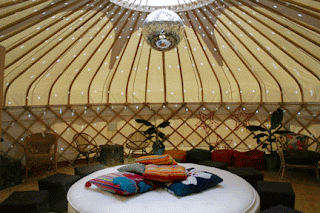As opposed to online networks (thing 6), thing 7 is about the real thing – real people meeting in real places. Ironically, the ‘real life’ meet up we held this week at Milgi’s yurt in Cardiff (below) couldn’t possibly have been arranged without blogs and Twitter, so don’t throw away the modem just yet!
I met up with colleagues from Cardiff University, as well as librarians from three other institutions in the city – UWIC, University of Glamorgan, and the National Museum of Wales, and even one very brave soul who made it all the way from the National Library of Wales, Aberystwyth! I was surprised that we managed to round up so many librarians working locally, most of whom I had not met before. It was lots of fun and very eye-opening, not all about CPD23(!), and it’s something I would certainly want to repeat in future.
Thing 7 also covers professional networks such as CILIP and ARA. I’ve been a member of ARA (Archives and Records Association) since I was an archives student in 2006. I like reading their magazine, which is informative and professionally presented, and also the journal, which is more academic in tone. I attended the annual conference once as a day delegate; I don’t think I got as much out of it as I would now that I ‘know’ several archivists on Twitter. None of the names on the delegate list were familiar to me and many seemed to have been sent en masse from the same organisation. This makes it tricky to break into a group and introduce yourself. I would go again, but lately the themes haven’t been relevant enough to convince the University to fund me. The vast majority of archivists working in the UK work for county record offices, and their concerns are sometimes very different to mine.
I wouldn’t say that I benefit from ARA training events either. Due to the relatively small numbers of UK archivists – compared to librarians, for example – training events, when they are held at all, tend to be centred in London. With the exception of the ARA Wales regional meeting, not one event or training session has been held in Wales this year. Fortunately my employer provides very good general management and IT courses, but as the only archivist, my needs are specialist and can’t be provided for institutionally. I was enrolled on an upcoming EAD course, organised by Archives Hub, but I have just heard it has been cancelled as only four were enrolled. If I really felt training were necessary, I would need to fund it privately, and this seems to be the way things are going. Once I have completed Registration, for which I need to have been a continuous member, I will sadly need to consider spending the membership money on funding myself to attend remote conferences and training.
ARA have, in line with CILIP, set up the social network ARA Community. While over 700 have joined, there is very little activity taking place (with the exception of spammers). Professional communities are in danger of reinventing the wheel, as there are many existing social networks such as Facebook and Twitter, which people are already using as part of their daily routine. Aside from social network fatigue, who can remember all the passwords?!
